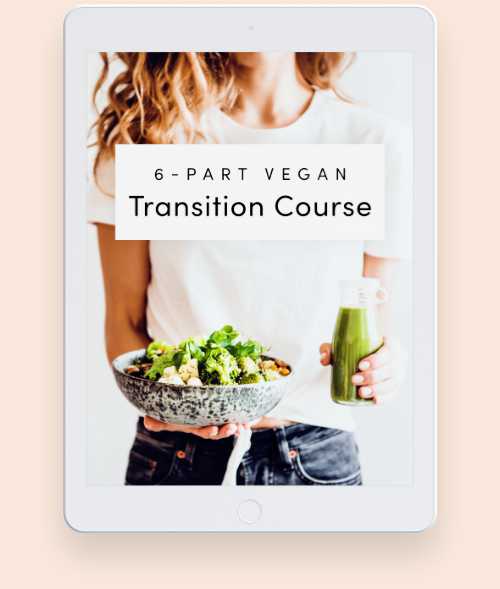One of the hardest things about being vegan is having to live with people who aren’t and who don’t understand why you have decided to adopt a lifestyle free from animal products. Sometimes living with non-vegans just means having to answer a huge volume of questions, but often it can mean being mocked, criticized and insulted.
Obviously, this can be really hard for anyone and even people with strong convictions will end up tired and weary of the same questions and arguments.
It can seem so strange and confusing that our friends and family, the people we are supposed to be able to trust and lean on for support, would be the people turning on us and disrespecting the choices we have made. So why does this happen?

join our free vegan course!
Learn how to thrive on a plant-based diet with practical tips & a 3-day meal plan!
Why Does Going Vegan Cause Friction?
Firstly, for whatever reason you decided to go vegan, whether it be for the environment, the animals or your health, you are indirectly implying that those who don’t go vegan with you are living in an immoral and unhealthy way.
Even without stating these things to non-vegans they immediately feel that way because logically, if you have gone vegan due to the fact that eating animals is immoral, you are then insinuating your friends and family are immoral if they continue to eat animals. You don’t even have to say this to them as they will come to this conclusion themselves, sometimes without even consciously being aware of it.
Switching Into Defense Mode
This is why so often one of the main defense mechanisms for non-vegans is to try and highlight a hypocrisy in your lifestyle. They’ll say something like, “animals still have to die to harvest crops for plants”, or “your phone was made in China by exploited workers”. It’s as if they feel that you are being morally superior by being vegan so they try and expose you as being immoral to justify their own bad habits.
Statements like that can be really annoying because they are basically saying there is no reason to try and make positive changes to your life because there will always be something that needs improving. If everyone lived with this mentality then we would never make any important changes and progress as a society.
The reality is, being vegan isn’t about being perfect or about being superior. Quite the opposite in fact, veganism is about highlighting that we are not superior and are instead equal to all life.
We recognize the fact that our actions are often immoral and perpetuate a system of exploitation which is precisely why we are trying to make changes in the first place, so attempting to demonstrate that we partake in oppressive industries is redundant as for many of us that is precisely why we began our transition to veganism in the first place.

Being Confronted With Feelings of Guilt
One of the other fundamental reasons that parents and friends often criticize us for going vegan is because it brings out feelings of guilt or even worry among them. If vegans prove that we can live healthily and happily without having to harm animals then it proves that they don’t need to eat animal flesh or secretions and in doing so they are sentencing animals to a life of confinement, pain, and death for no necessary reason.
Even though subconsciously most people are aware that we don’t need to harm animals and most even claim they are animal lovers, these same people have repressed this knowledge and chosen to favor willful ignorance over aligning their actions with their morals.
By being around vegans it forces them to confront within their own mind why they pay for animals to be killed, for the environment to be destroyed and also for their own bodies to be more susceptible to the leading killers of people in the Western world. Consequently, this causes their ego to try and justify why they are non-vegan and this causes confrontations in which our friends and family will criticize, question and mock us for going vegan.
Contemplating Health Risks
Furthermore, due to the fact our generation has the ability to seek and find an abundance of independent research that illustrates just how damaging eating animal products is to our health, our family will feel predictably concerned that the diet they have followed for their entire lives is, in fact, detrimental to the longevity of their life, which in turn causes misdirected anger.
Instead of being angry that they were lied to by the animal agriculture industries and the government, our parents can become angry at us for revealing the truth and breaking the wilful ignorance that so many people live comfortably with. There is also a hierarchal structure within families, parents believe it is their role to educate their children so when the roles are reversed naturally parents can become defensive.

How to Live With Non-Vegans
So what can you do to make this easier and less stressful?
1. Educate Yourself
The first thing to do is educate yourself as much as possible about all the different aspects of veganism so that you always have a well-educated answer to any questions people ask you. This is so important as not only will it make you feel more confident but once you’ve been able to answer all your family’s questions they will run out of arguments to have with you.
Also, if you can give educated responses it will make veganism seem more reputable and grounded in knowledge and fact. So arm yourself with a range of facts including; where you can obtain specific nutrients like protein and calcium from, the health implications of eating animals such as heart disease, diabetes and cancer and also the ethical and environmental problems associated with eating animals and their secretions.
2. Be Passionate
The next important thing is to be clear, determined and strong in your convictions, don’t be afraid to explain why you are vegan and why it is so important to you. The more passionate and committed you seem about veganism the more people around you will respect your decision. This ties in perfectly with educating yourself because the more knowledge you have, the more confidence you’ll have to effectively explain why you’re so passionate about being vegan.
3. Documentaries, Videos, and Articles
It’s important to try and get your family to understand why you went vegan so showing them any documentaries, videos or articles that inspired you to go vegan will go a long way in helping them to understand why you chose to make the transition. Family members won’t always watch a feature-length documentary so try showing them shorter videos on YouTube instead. There is a 15-minute version of ‘Cowspiracy’ on YouTube that is perfect for showing your family the facts without having to get them to sit down and watch a full-length film.
Other great videos:
101 Reasons to Go Vegan
Uprooting the Leading Causes of Death
Why Vegan?
The Most Inspiring Speech You Will Ever Hear
4. Cooking
Cooking is another really great tool to convince any skeptical family members that being vegan is easy and delicious. If you don’t know how to cook then learn and offer to cook meals for your family on a weekly basis, not only will your parents enjoy having one less job to do but it’s a great way to show how affordable and nutritious veganism can be.
You could also make muffins, cakes and veganize your family’s favorite meals. You should also buy your own products and get vegan versions of as many household foods as possible, this shows just how easy it is to live vegan and that you don’t have to give anything up.
5. Stay Strong
Most importantly, don’t let being a vegan in a non-vegan house get you down. Try and remain as positive and focused as possible, after all, veganism is a complete shift and a challenge to many societal norms. It goes against so much of what we have been taught and waking up to the realization that we can live an alternate way that doesn’t involve slaughtering trillions of animals each year is a huge awakening.
It’s only natural to feel despair and frustration when people mock or simply don’t understand veganism as to us it is so grounded in logic it seems impossible to not understand. If your family refuse to listen and won’t go vegan then find some vegan friends, there are so many vegan groups on social media and meetups in varying cities that it is easy to connect with like-minded people who share the same values as yourself.
What are your personal tips and experiences for living with non-vegan? Has your relationship changed or maybe even improved? Let us know in the comments below.



Loved to read this article :) Thank you for sharing
Glad you found it helpful! Most us of had to deal with this situation at some point… do you have any additional tips?
Thanks Ed :) thoughtful & well written as always. I’m proud to be in the company of vegans like you
He really is one of the kindest and most thoughtful vegans I have known! We were flattered to have him share his wisdom on our blog :)
I really love how Ed highlighted that being vegan isn’t about being perfect or superior. Our choices should portray the fact that we are aware of cruel ways and choose to do something about it. The keyword – choose. And we should act in accordance. Let others choose. All we can do is be an inspiring example what can be achieved with a little work and a lot of determination. And, just like Ed said, to be passionate and stay strong.
Well put, thanks for your thoughts!
This is really helpful, thank you. I am instantly reminded of the quote by Geroge Bernard Shaw when asked WHY he was a vegetarian:
“Oh, come! That boot is on the other leg. Why should you call me to account for eating decently? If I battened on the scorched corpses of animals, you might well ask me why I did that.”
Thanks so much for sharing! Love the quote x
It’s heartening to see how other vegans handle the challenges that come with the lifestyle – this article makes it clear that all vegans face the same sorts of situations, criticism and have similar thoughts no matter where in the world we are from/based. Really well written, and so relatable!
It’s heartening to see how other vegans handle the challenges that come with the lifestyle – it’s clear from this article that all vegans face the same situations, criticism and have similar thoughts regardless of where in the world they are from/based. Really well written, and so relatable!
One thing I may add. There is no one so deaf as that who would not listen. I have a niece 20+ who with her family visit me regularly and talk falls on veganism and the cruelty to animals. BTW I am the only vegan. One fine day her mother phoned up and told me Listen don’t take up veganism etc when we are there cos J cries her eyes out back home.
So she is so concerned about the fact but she wont change.